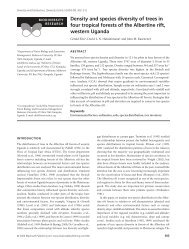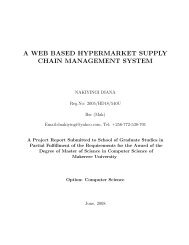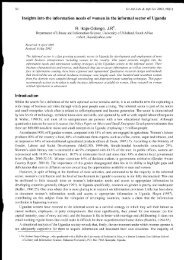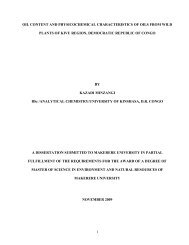THE UNIVERSITY OF LEIPZIG
THE UNIVERSITY OF LEIPZIG
THE UNIVERSITY OF LEIPZIG
Create successful ePaper yourself
Turn your PDF publications into a flip-book with our unique Google optimized e-Paper software.
8.3 Re-visiting and re-conceptualizing institutionalism and participation in Kakamega<br />
Lessons to learn from institutionalism and participation in Kakamega<br />
As we draw ourselves to the close of this treatment, it is imperative to illustrate the kind of<br />
lessons that ought to be learnt from the process of institutionalism and participation in<br />
Kakamega. One such lesson will be made in light of what Oliphant pointed out. He noted that<br />
whether participation is regarded as a means to achieving an end, or as an end in itself, or<br />
whether it is merely a matter of principle, or of practice, or both, the key question is whether it<br />
makes any real difference to those most directly affected by any planned intervention. 681 In<br />
other words we ask: does the participation enable the communities to have their voices heard?<br />
Does it enable them to assert their own ideas about what their needs and problems are, what<br />
solutions need to be found, and what resources are made available? Does it enable the<br />
creation of a shared institutional system of meaning among the key players, as they jointly<br />
construct a new institutional pattern to govern an existing resource regime? These questions<br />
illuminate the key elements that define drawbacks in the institutional and participation<br />
process, as evidenced in the management of Kakamega forest.<br />
There are varied views on which level of participation is most appropriate, and its importance<br />
that those using participation clarify its specific application. For instance, Finkel and Bevis<br />
point out that participation in formal procedures like attending community meetings, joining<br />
with others to raise issues or contacting elected leaders can have an educative effect,<br />
increasing interest and efficacy as well as building support for development. 682 However,<br />
Bratton et al. argue that institutions aimed at generating real participation should find ways of<br />
shifting from the commonly passive, incentive-driven participation towards the more<br />
interactive end of the spectrum. 683 Others like Ulfelder and Poats labour to question the reality<br />
of community self-mobilization. They argue that not all local communities possess the<br />
organizational skills and technical knowledge to conduct forest management. They also<br />
highlighted the dangers of these supposedly ‘ideal’ bottom-up activities as they may lead to<br />
inequalities in the community, with complete auto-mobilization generating conservation<br />
activities that favour the powerful locals and prejudice against socially disadvantaged<br />
members of the community. 684<br />
Thus, the lack of a universally agreed-upon definition of participation is not only due to<br />
differences in scale and interpretation, but also due to fundamental differences in the moral<br />
grounds regarding the effectiveness of a particular approach. At a more local level of resource<br />
681 Ulfelder, W. H. and S. V. Poats. 1997. Buscando la Conservacion Participativa. Quito, Ecuador. The Nature<br />
Conservancy and Facultad Latinoamericana de Ciencias Sociales 1:1-30.<br />
682 Finkel, C. S and Bevis, G. 2000. “Civic Education, Civil Society and Political Mistrust in a Developing<br />
Democracy: The Case of the Dominican Republic. World Development 24: 1851-1874.<br />
683 Bratton, Michael, Robert Mattes and E. Gyimah-Boadi. 2003. Learning About Reform: People, Democracy,<br />
and Markets in Africa. Cambridge: Cambridge University Press.<br />
684 Posey, D. A. 1992. "Traditional Knowledge, Conservation and `The Rainforest Harvest'." In Sustainable<br />
Harvest and Marketing of Rain Forest Products, edited by. M. Plotkin and L. Famolare, 441-443.<br />
Washington, DC: Conservation International, Island Press.<br />
184






